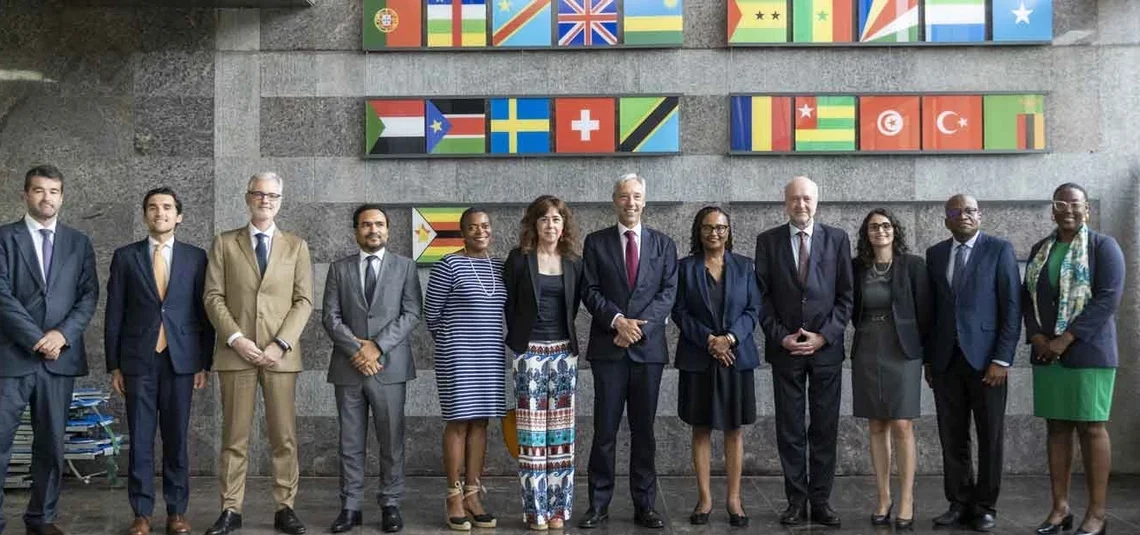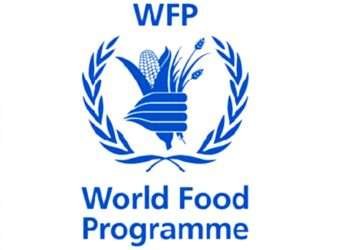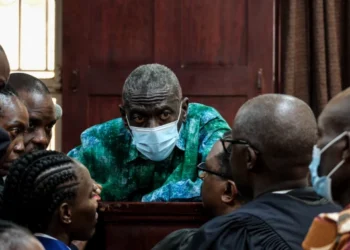Portuguese Foreign Affairs Minister João Gomes Cravinho has affirmed his country’s continuing support for the African Development Bank during a meeting at the Bank’s headquarters in Abidjan.
Portugal has been a non-regional member of the Bank since 1983. Cravinho met with African Development Bank Group Senior Vice President Swazi Tshabalala and members of the finance, and resource mobilisation departments.
The parties discussed their mutual relationship and the Lusophone Compact agreement signed between the African Development Bank, the government of Portugal and six Portuguese speaking African countries – Angola, Cabo Verde, Equatorial Guinea, Guinea-Bissau, Mozambique and São Tomé and Principe in November 2018.
The minister also expressed interest in the increased use of Portuguese as a language within the Bank. The Bank has five Portuguese speaking African countries as members and Portuguese is increasingly a language of business, he said.
Cravinho noted that Portugal, which has viewed the African continent as extremely important to its foreign policy agenda, is keenly interested in the Bank’s assessment of the Lusophone Compact thus far. He said the Compact, developed to create a new mechanism of benefit to all the countries, could have an even greater reach.
“Our sense is that it’s insufficiently known and probably insufficiently used,” Cravinho said, adding that Portugal stood ready to assist countries in maximizing the benefits of the agreement.
The minister Indicated that Portugal is also keen to expand its ties with non-Lusophone countries such as Senegal, South Africa and Côte d’Ivoire, and to possibly extend the Lusophone Compact to those countries and beyond.
Tshabalala described the African Development Bank’s relationship with Portugal as growing. She said the Lusophone Compact had tremendous potential and its signing had strengthened the relationship further. She thanked Portugal for both the Compact and its contribution to the replenishment of the African Development Fund, the Bank’s concessional lending window, which covers several Lusophone Compact countries.
Difficult Time for Many African Countries
Tshabalala said Portugal’s support came at a particularly difficult time for many African countries. She added that she looked forward to continuing relationships with partnerships that delivered value. “We welcome the interest in expanding beyond the Lusophone countries – in terms of operations. Support is required to improve the environment,” Tshabalala said.
The Senior Vice President noted that the African Development Bank had made meaningful progress, especially with a pipeline of transactions under the Lusophone Compact. The discussion revealed that while great effort has been made to inform member countries of the Lusophone Compact, there is still not enough awareness of the benefits of the agreement to them. Bank staff explained that around 23 projects on the Lusophone Compact pipeline still require much work to be brought to bankability.
Cravinho expressed Portugal’s delight at the successful 16th replenishment of the African Development Fund in December 2022 (ADF-16). Portugal is also championing a proposal to allow the African Development Fund to borrow from capital markets. Its success in doing so would allow the African Development Bank to better fulfill its mandate. Portugal is in full support of this move, Cravinho said, especially given its focus on a green transition and concerted climate change action.
The discussions also touched on the Climate Action Window, introduced as part of ADF 16. The window covers 37 African Development Fund member countries, which are also among the world’s most fragile and vulnerable countries to climate change. Tshabalala said the Bank welcomed Portugal’s support for the window, which has a special focus on climate adaptation.
Niels Breyer, Executive Director for Portugal, Germany, Luxemburg, and Switzerland at the African Development Bank Group said the Bank was making progress on the development of a number of green initiatives. He noted that the Climate Action Window could really make a difference.
Accompanying the Portuguese foreign minister were Ambassador Maria Da Conceição Pilar, the country’s principal representative in Côte d’Ivoire, João Queirós deputy director-general responsible for foreign policy in the Ministry of Foreign Affairs, Advisor Carlos Teixeira, and Communication Advisor Rita Roque.
READ ALSO: Ghana Shippers Authority Makes Strong Case for Revision of Maritime Law to Tackle Port Challenges























